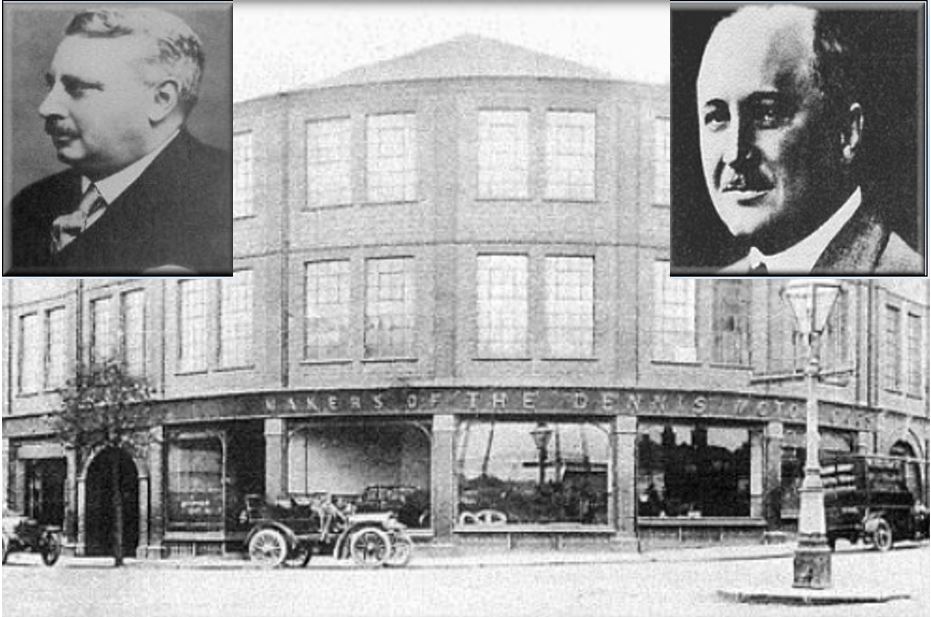
For most of the 20th century, the name Dennis was associated with fire engines, dust carts and buses. Dennis vehicles based on the Woodbridge Road, to the north of Guildford, was the town’s largest employer and responsible for the creation of an entire residential area known as Dennisville.
High Street shop and Rodboro factory
The company was founded by two brothers John Dennis (1871–1939) and Raymond Dennis (1878–1939) who moved to Guildford from Huntshaw in Devon. Initially they made Speed King bicycles, capitalising on the popularity for cycling through the Surrey hills in the late nineteenth century. Starting in the High Street they moved their business to the former barracks at the bottom of North Street in 1900 and then in 1901 to Onslow Street (now Rodboro Building) which was one of the first purpose built car factories in the country.
- 1895: Opened their shop The Universal Athletic Stores, 94 High Street, where they built bicylces
- 1898: Built a motorised tricycle (their first motorised vehicle)
- 1900: Moved to former barracks at the bottom of North Street
- 1901: Moved to Onslow Street site
- 1901: Built their first car
- 1904: First commercial vehicle built – a van for Harrods of London
- 1904: First bus built
- 1908: First fire engine built
- 1913: Car production ceased and Dennis focused entirely on commercial vehicles
- 1919: Onslow Street site sold to Roboro Boot and Shoe Company. All production moved to the already owned Woodbridge Hill site
Woodbridge Hill Site
During both world wars Dennis was involved in vehicle production for the war effort and assembled Churchill tanks amongst other vehicle during the Second World War. From the 1920s the company started municipal vehicles and even lawn mowers (from 1922)
- 1919: All production moved to Woodbridge Road
- 1919: Dennis gained controlling interest in the supplier of their engines, Coventry based White and Poppe following a merger
- 1933: White and Poppe engine manufacture moved to Guildford from Coventry
- 1930s: 220 houses built for workers for Coventry workers and the area became known as Dennisville. Streets were named after founders e.g. Raymond Crescent and former directors e.g. Pentreath Avenue.
- 1939: John and Raymond Dennis died
- 1972: Dennis bought by Hestair Group
- 1971/72: Dennis sold houses in Slyfield’s Woking Road and in Middleton Road, Dennisville
- 1977: Dennis Motors Limited rebranded Hestair Dennis Limited
- 1985: Production moved to Warwick to new Dennis Eagle factory. Chassis production remained in Guildford but 600 jobs lost
- 1985: John Dennis Coachbuilders bought the fire engine bodyworks business and manufactured at Merrow initially and later Slyfield Green.
Slyfield
From 1980s onwards the Dennis business was broken up and the remainder subject to several take-overs.
- 1989: Dennis sold by Hestair to Trinity Holdings in a management buy out
- 1990/1991: Woodbridge Road site closed and chassis production moved to purpose built factory at Slyfield Green, Guildford with 300 workers
- 1998: Trinity Holdings bought by Mayflower Corporation
- 2004: Mayflower Corporation went into administration and was acquired by a consortium which established Alexander Dennis Limited
- 2007: Alexander Dennis became Britain’s largest coach and bus manufacturer
- 2019: John Dennis Coachworks closed
- 2020: Chassis production ceased on Slyfield site
Fire Engines, Dust Carts and Buses
To people of a certain age Dennis is associated with fire engines but today you are more likely to see the brand on local dustcarts. Fire engines were a major part of the Dennis portfolio – about 100 a year and 50% of the UK market. Chasis were built at Guildford with the cabs at Blackpool alongside refuse vehicle cabs.
Matters changed in the 1985. John Dennis Coachbuilders bought out the body building element of the fire engines and set up in Merrow initially, later moving to Slyfield. This allowed Dennis to compete with other manufacturers and build on different chasis.
More changes followed the takeover in 1998 by the Mayflower Group. They already owned Alexanders, one of the major bus bodybuilders and saw opportunities to grow the business. They saw less of a future in the refuse business and offloaded the Dennis Eagle business in 1999. Ironically, of the Elite refuse brand prospered post-Mayflower, due to design work carried out whilst part of Dennis. Dennis Eagle continued to build the fire engine cabs at Blackpool very successfully.
Mayflower overstretched themselves and went into administration resulting in the creation of Alexander Dennis Ltd. Although buses were now the main business, fire engine chassis manufacture continued. The two key fire products were the Rapier and Sabre and many fire fighters regarded them as the finest fire fighting appliances ever produced – they were renowned for their performance and handling.
Eventually, however, changes in way the fire service purchased equipment and their need to buy in smaller quantities that Dennis Eagle could justify resulted in the end of production. The last Dennis Sabre chassis was rolled out in 2007 and although John Dennis Coachworks continued making body works it eventually closed in 2019.
For more information see Auto News article.
Future of Dennis
The Dennis name lives on in Dennis Eagle dustcarts, through Alexander Dennis buses and Dennis Lawn Mowers. In 1971 Hestair bought Eagle Engineering, a dust cart bodybuilder. In 1999 this was sold to Natwest Equity Partners and this is now Dennis Eagle, part of the Terberg RosRoca Group. It supplies around 1000 units a year to UK municipal authorities. Dennis dust carts are still a familiar sight on the streets of Guildford in 2021.
Further Information
General History
https://dennissociety.org.uk/history.html
Fire Engines
Closure of
https://www.getsurrey.co.uk/news/surrey-news/iconic-guildford-fire-engine-manufacturer-15775984
https://www.getsurrey.co.uk/news/surrey-news/uncertainty-over-future-iconic-john-14329793
Dust Carts
http://www.classicrefusetrucks.com/albums/albumpool2/DN.html
https://www.dennis-eagle.co.uk/en/about/
https://en.wikipedia.org/wiki/Dennis_Specialist_Vehicles#Transbus_International
https://en.wikipedia.org/wiki/Dennis_Eagle